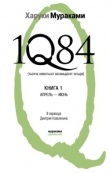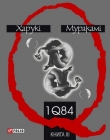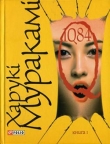
Текст книги "1q84"
Автор книги: Haruki Murakami
Жанр:
Современная проза
сообщить о нарушении
Текущая страница: 59 (всего у книги 81 страниц)
CHAPTER 9
Tengo
BEFORE THE EXIT IS BLOCKED
The four of them had yakiniku, then went to another place where they sang karaoke and polished off a bottle of whiskey. It was nearly ten p.m. when their cozy but boisterous little party broke up. After they left the bar, Tengo took Nurse Adachi back to her apartment. The other two women could catch a bus near the station, and they casually let things work out that way. Tengo and the young nurse walked down the deserted streets, side by side, for a quarter of an hour.
“Tengo, Tengo, Tengo,” she sang out. “Such a nice name. Tengo. It’s so easy to say.”
Nurse Adachi had drunk a lot, but her cheeks were normally rosy so it was hard to tell, just by looking at her face, how drunk she really was. Her words weren’t slurred and her footsteps were solid. She didn’t seem drunk. Though people had their own ways of being drunk.
“I always thought it was a weird name,” Tengo said.
“It isn’t at all. Tengo. It has a nice ring to it and it’s easy to remember. It’s a wonderful name.”
“Speaking of which, I don’t know your first name. Everybody calls you Ku.”
“That’s my nickname. My real name is Kumi. Kind of a nothing name.”
“Kumi Adachi,” Tengo said aloud. “Not bad. Compact and simple.”
“Thank you,” Kumi Adachi said. “But putting it like that makes me feel like a Honda Civic or something.”
“I meant it as a compliment.”
“I know. I get good mileage, too,” she said, and took Tengo’s hand. “Do you mind if I hold your hand? It makes it more fun to walk together, and more relaxed.”
“I don’t mind,” Tengo replied. Holding hands like this with Kumi Adachi, he remembered Aomame and the classroom in elementary school. It felt different now, but there was something in common.
“I must be a little drunk,” Kumi said.
“You think so?”
“Yup.”
Tengo looked at the young nurse’s face again. “You don’t look drunk.”
“I don’t show it on the outside. That’s just the way I am. But I’m wasted.”
“Well, you were knocking them back pretty steadily.”
“I know. I haven’t drunk this much in a long time.”
“You just have to get out like this sometimes,” Tengo said, quoting Mrs. Tamura.
“Of course,” Kumi said, nodding vigorously. “People have to get out sometimes—have something good to eat, have some drinks, belt out some songs, talk about nothing in particular. But I wonder if you ever have times like that. Where you just get it out of your system, to clear your head? You always seem so cool and composed, Tengo.”
Tengo thought about it. Had he done anything lately to unwind? He couldn’t recall. If he couldn’t recall, that probably meant he hadn’t. The whole concept of getting something out of his system was something he might be lacking.
“Not so much, I guess,” Tengo admitted.
“Everybody’s different.”
“There are all sorts of ways of thinking and feeling.”
“Just like there are lots of ways of being drunk,” the nurse said, and giggled. “But it’s important, Tengo.”
“You may be right,” he said.
They walked on in silence for a while, hand in hand. Tengo felt uneasy about the change in the way she spoke. When she had on her nurse’s uniform, Kumi was invariably polite. But now in civilian clothes, she was more outspoken, probably partly due to the alcohol. That informal way of talking reminded him of someone. Somebody had spoken the same way. Someone he had met fairly recently.
“Tengo, have you ever tried hashish?”
“Hashish?”
“Cannabis resin.”
Tengo breathed in the night air and exhaled. “No, I never have.”
“How about trying some?” Kumi Adachi asked. “Let’s try it together. I have some at home.”
“You have hashish?”
“Looks can be deceiving.”
“They certainly can,” Tengo said vaguely. So a healthy young nurse living in a seaside little town on the Boso Peninsula had hashish in her apartment. And she was inviting him to smoke some.
“How did you get ahold of it?” Tengo asked.
“A girlfriend from high school gave it to me for a birthday present last month. She had gone to India and brought it back.” Kumi began swinging Tengo’s hand with her own in a wide arc.
“But there’s a stiff penalty if you’re caught smuggling pot into the country. The Japanese police are really strict about it. They have pot-sniffing dogs at the airports.”
“She’s not the type to worry about little details,” Kumi said. “Anyhow, she got through customs okay. Would you like to try it? It’s high-quality stuff, very potent. I checked into it, and medically speaking there’s nothing dangerous about it. I’m not saying it isn’t habit forming, but it’s much milder than tobacco, alcohol, or cocaine. Law enforcement says it’s addictive, but that’s ridiculous. If you believe that, then pachinko is far more dangerous. You don’t get a hangover, so I think it would be good for you to try it to blow off some steam.”
“Have you tried it yourself?”
“Of course. It was fun.”
“Fun,” Tengo repeated.
“You’ll understand if you try it,” Kumi said, and giggled. “Say, did you know? When Queen Victoria had menstrual cramps she used to smoke marijuana to lessen the pain. Her court doctor actually prescribed it to her.”
“You’re kidding.”
“It’s true. I read it in a book.”
Which book? Tengo was about to ask, but decided it was too much trouble. That was as far as he wanted to go picturing Queen Victoria having menstrual cramps.
“So how old were you on your birthday last month?” Tengo asked, changing subjects.
“Twenty-three. A full-fledged adult.”
“Of course,” Tengo said. He was already thirty, but yet to have a sense of himself as an adult. It just felt to him like he had spent thirty years in the world.
“My older sister is staying over tonight at her boyfriend’s, so I’m by myself. So come on over. Don’t be shy. I’m off duty tomorrow so I can take it easy.”
Tengo searched for a reply. He liked this young nurse. And she seemed to like him, too. But she was inviting him to her place. He looked up at the sky, but it was covered with thick gray clouds and he couldn’t see the moons.
“The other day when my girlfriend and I smoked hashish,” Kumi began, “that was my first time, but it felt like my body was floating in the air. Not very high, just a couple of inches. You know, floating at that height felt really good. Like it was just right.”
“Plus you won’t hurt yourself if you fall.”
“Yeah, it’s just the right height, so you can feel safe. Like you’re being protected. Like you’re wrapped in an air chrysalis. I’m the dohta, completely enveloped in the air chrysalis, and outside I can just make out maza.”
“Dohta?” Tengo asked. His voice was surprisingly hard. “Maza?”
The young nurse was humming a tune, swinging their clasped hands as they walked down the deserted streets. She was much shorter than Tengo, but it didn’t seem to bother her at all. An occasional car passed by.
“Maza and dohta. It’s from the book Air Chrysalis. Do you know it?” she asked.
“I do.”
“Have you read it?”
Tengo silently nodded.
“Great. That makes things easier. I love that book. I bought it in the summer and read it three times. I hardly ever read a book three times. And as I was smoking hashish for the first time in my life I thought it felt like I was inside an air chrysalis myself. Like I was enveloped in something and waiting to be born. With my maza watching over me.”
“You saw your maza?” Tengo asked.
“Yes, I did. From inside the air chrysalis you can see outside, to a certain extent. Though you can’t see in from outside. That’s how it’s structured. But I couldn’t make out her expression. She was a vague outline. But I knew it was my maza. I could feel it very clearly. That this person was my maza.”
“So an air chrysalis is actually a kind of womb.”
“I guess you could say that. I don’t remember anything from when I was in the womb, so I can’t make an exact comparison,” Kumi Adachi said, and giggled again.
It was the kind of cheaply made two-story apartment building you often find in the suburbs of provincial cities. It looked fairly new, yet it was already starting to fall apart. The outside stairway creaked, and the doors didn’t quite hang right. Whenever a large truck rolled by outside, the windows rattled. The walls were thin, and if anyone were to practice a bass guitar in one of the apartments, the whole building would end up being one large sound box.
Tengo wasn’t all that drawn to the idea of smoking hashish. He had a sane mind, yet he lived in a world with two moons. There was no need to distort the world any more than that. He also didn’t have any sexual desire for Kumi Adachi. Certainly he did feel friendly toward this young twenty-three-year-old nurse. But friendliness and sexual desire were two different things, at least for Tengo. So if she hadn’t mentioned maza and dohta, most likely he would have made up an excuse and not gone inside. He would have taken a bus back, or, if there weren’t any buses, he would have had her call a cab, and then returned to the inn. This was, after all, the cat town. It was best to avoid any dangerous spots. But once Kumi mentioned the words maza and dohta, Tengo couldn’t turn down her invitation. Maybe she could give him a hint as to why the young Aomame had appeared in the air chrysalis in the hospital room.
The apartment was a typical place for two sisters in their twenties living together. There were two small bedrooms, plus a combined kitchen and dining room that connected to a tiny living room. The furniture looked thrown together from all over, with no unifying style. Above the laminated dining table there hung a tacky imitation Tiffany lamp, quite out of place. If you were to open the curtain, with its tiny floral pattern, outside there was a cultivated field, and beyond that, a thick, dark grove of various trees. The view was nice, with nothing to obstruct it, but far from heartwarming.
Kumi sat Tengo down on the love seat in the living room—a gaudy, red love seat—facing the TV. She took out a can of Sapporo beer from the fridge and set it down, with a glass, in front of him.
“I’m going to change into something more comfortable, so wait here. I’ll be right back.”
But she didn’t come back for a long time. He could hear the occasional sound from behind the door across the narrow corridor—the sound of drawers that didn’t slide well, opening and closing, the thud of things clunking to the ground. With each thud, Tengo couldn’t help but look in that direction. Maybe she really was drunker than she looked. He could hear a TV through the thin walls of the apartment. He couldn’t make out what the people were saying, but it appeared to be a comedy show, and every ten or fifteen seconds there was a burst of laughter from the audience. Tengo regretted not having turned down her invitation. At the same time, though, in a corner of his mind he felt it was inevitable that he had come here.
The love seat was cheap, and the fabric itched whenever his skin touched it. Something bothered him, too, about the shape of it, and he couldn’t get comfortable no matter how he shifted around. This only amplified his sense of unease. Tengo took a sip of beer and picked up the TV remote from the table. He stared at it for a time, as if it were some odd object, and then hit the on button. He surfed through a few channels, finally settling on an NHK documentary about railroads in Australia. He chose this program simply because it was quieter than the others. While an oboe piece played in the background, a woman announcer was calmly introducing the elegant sleeper cars in the line that ran across the whole of Australia.
Tengo sat there in the uncomfortable love seat, unenthusiastically following the images on the screen, but his mind was on Air Chrysalis. Kumi Adachi had no idea that he was the one who had really written the book. Not that it mattered—what did matter was that while he had written such a detailed description of the air chrysalis, Tengo knew next to nothing about it. What was an air chrysalis? And what did maza and dohta signify? He had no idea what they meant when he wrote Air Chrysalis, and he still didn’t. Still, Kumi liked the book and had read it three times. How could such a thing be possible?
Kumi came back out as the show was discussing the dining-car menu. She plunked down on the love seat next to Tengo. It was so narrow their shoulders touched. She had changed into an oversized long-sleeved shirt and faded cotton pants. The shirt had a large smiley face on it. The last time Tengo had seen a smiley face was the beginning of the 1970s, back when Grand Funk Railroad rattled the jukeboxes with their crazy loud songs. But the shirt didn’t look that old. Somewhere, were people still manufacturing smiley-face shirts?
Kumi took a fresh beer from the fridge, loudly popped it open, poured it in her glass, and chugged down a third of it. She narrowed her eyes like a satisfied cat and pointed at the TV screen. In between red cliffs the train was traveling down an endlessly straight line.
“Where is this?”
“Australia,” Tengo said.
“Australia,” Kumi Adachi said, as if searching the recesses of memory. “The Australia in the Southern Hemisphere?”
“Right. The Australia with the kangaroos.”
“I have a friend who went to Australia,” Kumi said, scratching next to her eye. “It was right during the kangaroo mating season. He went to one town and the kangaroos were doing it all over the place. In the parks, in the streets. Everywhere.”
Tengo thought he should make a comment, but he couldn’t think of anything. Instead he took the remote and turned off the TV. With the TV off, the room suddenly grew still. The sound of the TV next door, too, was gone. The occasional car would pass by on the road outside, but other than that it was a quiet night. If you listened carefully, though, there was a muffled, far-off sound. It was steady and rhythmic, but Tengo had no idea what it was. It would stop for a time, then start up again.
“It’s an owl,” the nurse explained. “He lives in the woods nearby. He hoots at night.”
“An owl,” Tengo repeated vaguely.
Kumi rested her head on his shoulder and held his hand. Her hair tickled his neck. The love seat was still uncomfortable. The owl continued hooting knowingly off in the woods. That voice sounded encouraging to Tengo, but at the same time like a warning. Or maybe a warning that contained a note of encouragement. It was a very ambiguous sound.
“Tell me, do you think I’m too forward?” Kumi Adachi asked.
Tengo didn’t reply. “Don’t you have a boyfriend?”
“That’s a perplexing question,” she said, indeed looking a bit perplexed. “Most of the smart young men head off to Tokyo as soon as they graduate from high school. There are no good colleges here, and not enough decent jobs, either. They have no other choice.”
“But you’re here.”
“Yes. Considering the lousy pay they give us, the work is pretty hard. But I kind of like living here. The problem is finding a boyfriend. I’m open to it if I find someone, but there aren’t so many chances.”
The hands of the clock on the wall pointed to just before eleven. If he didn’t go back to the inn by the eleven o’clock curfew, he wouldn’t be able to get in. But Tengo couldn’t rouse himself from the cramped love seat. His body just wouldn’t listen. Maybe it was the shape of the chair, or maybe he was drunker than he thought. He listened vaguely to the owl’s hooting, felt Kumi’s hair tickle his neck, and gazed at the faux Tiffany lamp.
Kumi Adachi whistled cheerfully as she prepared the hashish. She used a safety razor to slice thin slices off a black ball of hash, stuffed the shavings into a small, flat pipe, and then, with a serious look on her face, lit a match. A unique, sweetly smoky smell soon filled the room. Kumi took the first hit. She inhaled deeply, held it in her lungs for a long time, then slowly exhaled. She motioned to Tengo to do the same. Tengo took the pipe and followed her example. He tried to hold the smoke in his lungs as long as possible, and then let it out ever so slowly.
They leisurely passed the pipe back and forth, never exchanging a word. The neighbor next door switched on his TV and they could hear the comedy show again. The volume was a bit louder than before. The happy laughter of the studio audience swelled up, the laughter only stopping during the commercials.
They took turns smoking for about five minutes, but nothing happened. The world around Tengo was unchanged—colors, shapes, and smells were the same as before. The owl kept on hooting in the woods, Kumi Adachi’s hair on his neck still itched. The two-person love seat remained uncomfortable. The second hand on the clock ticked away at the same speed and the people on TV kept on laughing out loud when someone said something funny, the kind of laugh that you could laugh forever but never end up happy.
“Nothing’s happening,” Tengo said. “Maybe it doesn’t work on me.”
Kumi lightly tapped his knee twice. “Don’t worry. It takes time.”
And she was right. Finally it hit him. He heard a click, like a secret switch being turned on, and then something inside his head sloshed thickly. It felt like tipping a bowl of rice porridge sideways. My brain is vibrating, Tengo thought. This was a new experience for him—considering his brain as an object apart from the rest of him, physically experiencing the viscosity of it. The deep hoot of the owl came in through his ears, mixed with the porridge inside, and melted into it.
“The owl is inside me,” Tengo commented. The owl had become a part of his consciousness, a vital part that couldn’t be separated out.
“The owl is the guardian deity of the woods. He knows all and gives us the wisdom of the night,” Kumi said.
But where and how should he seek this wisdom? The owl was everywhere, and nowhere. “I can’t think of a question to ask him,” Tengo said.
Kumi Adachi held his hand. “There’s no need for questions. All you need to do is go into the woods yourself. That way is much simpler.”
He could hear laughter again from the comedy next door. Applause as well. The show’s assistant, off camera, was probably holding up cue cards to the audience that said Laugh and Applaud. Tengo closed his eyes and thought of the woods, of himself going into the woods. Deep in the dark forest was the realm of the Little People. But the owl was still there too. The owl knows all and gives us the wisdom of the night.
Suddenly all sound vanished, as if someone had come up behind him stealthily and stuck corks in his ears. Someone had closed one lid, while someone else, somewhere, had opened another lid. Entrance and exit had switched.
Tengo found himself in an elementary school classroom.
The window was wide open and children’s voices filtered in from the schoolyard. The wind blew, almost as an afterthought, and the white curtains waved in the breeze. Aomame was beside him, holding his hand tightly. It was the same scene as always—but something was different. Everything he could see was crystal clear, almost painfully clear, fresh and focused down to the texture. He could make out each and every detail of the forms and shapes of things around him. If he reached out his hand, he could actually touch them. The smell of the early-winter afternoon hit him strongly, as if what had been covering up those smells until then had been yanked away. Real smells. The set smells of the season: of the blackboard erasers, the floor cleaner, the fallen leaves burning in the incinerator in a corner of the schoolyard—all these were mixed inseparably together. When he breathed in these scents, he felt them spread out deep and wide within his mind. The structure of his body was being reassembled. His heartbeat was no longer just a heartbeat.
For an instant, he could push the door of time inward. Old light mixed with the new light, the two becoming one. The old air mixed in with the new to become one. It is this light, and this air, Tengo thought. He understood everything now. Almost everything. Why couldn’t I remember this smell until now? It’s so simple. It’s such a straightforward world, yet I didn’t get it.
“I wanted to see you,” Tengo said to Aomame. His voice was far away and faltering, but it was definitely his voice.
“I wanted to see you, too,” the girl said. The voice sounded like Kumi Adachi’s. He couldn’t make out the boundary between reality and imagination. If he tried to pin it down, the bowl slipped sideways and his brains sloshed around.
Tengo spoke. “I should have started searching for you long ago. But I couldn’t.”
“It’s not too late. You can still find me,” the girl said.
“But how can I find you?”
No response. The answer was not put into words.
“But I know I can find you,” Tengo said.
The girl spoke. “Because I could find you.”
“You found me?”
“Find me,” the girl said. “While there’s still time.”
Like a departed soul that had failed to leave in time, the white curtain soundlessly and gently wavered. That was the last thing Tengo saw.
When he came to, he was lying in a narrow bed. The lights were out, the room faintly lit by the streetlights filtering in through a gap in the curtains. He was wearing a T-shirt and boxers. Kumi wore only her smiley-face shirt. Underneath the long shirt, she was nude. Her soft breasts lay against his arm. The owl was still hooting in Tengo’s head. The woods lingered inside him—he was still clinging to the nighttime woods.
Even in bed like this with the young nurse, he felt no desire. Kumi seemed to feel the same way. She wrapped her arms around his body and giggled. What was so funny? Tengo had no idea. Maybe somebody, somewhere, was holding out a sign that said Laugh.
What time could it be? He lifted his head to look for a clock but couldn’t see any. Kumi suddenly stopped laughing and wrapped her arms around his neck.
“I was reborn,” she said, her hot breath brushing his ear.
“You were reborn,” Tengo said.
“Because I died once.”
“You died once,” Tengo repeated.
“On a night when there was a cold rain falling,” she said.
“Why did you die?”
“So I would be reborn like this.”
“You would be reborn,” Tengo said.
“More or less,” she whispered very quietly. “In all sorts of forms.”
Tengo pondered this statement. What did it mean to be reborn more or less, in all sorts of forms? His brain was heavy, and was brimming with the germs of life, like some primeval sea. Not that these led him anywhere.
“Where do air chrysalises come from, anyway?”
“That’s the wrong question,” Kumi said, and chuckled.
She twisted her body on top of his and Tengo could feel her pubic hair against his thighs. Thick, rich hair. It was like her pubic hair was a part of her thinking process.
“What is necessary in order to be reborn?” Tengo asked.
“The biggest problem when it comes to being reborn,” the small nurse said, as if revealing a secret, “is that people aren’t reborn for their own sakes. They can only do it for someone else.”
“Which is what you mean by more or less, in all sorts of forms.”
“When morning comes you will be leaving here, Tengo. Before the exit is blocked.”
“When morning comes I’ll be leaving here,” Tengo repeated the nurse’s words.
Once more she rubbed her rich pubic hair against his thigh, as if to leave behind some sort of sign. “Air chrysalises don’t come from somewhere. They won’t come no matter how long you wait.”
“You know that.”
“Because I died once,” she said. “It’s painful to die. Much more painful than you imagine, Tengo. You are utterly lonely. It’s amazing how completely lonely a person can be. You had better remember that. But you know, unless you die once, you won’t be reborn.”
“Unless you die once, you won’t be reborn,” Tengo confirmed.
“But people face death while they’re still alive.”
“People face death while they’re still alive,” Tengo repeated, unsure of what it meant.
The white curtain continued to flutter in the breeze. The air in the classroom smelled of a mixture of blackboard erasers and cleaner. There was the scent of burning leaves. Someone was practicing the recorder. The girl was squeezing his hand tightly. In his lower half he felt a sweet ache, but he didn’t have an erection. That would come later on. The words later on promised him eternity. Eternity was a single long pole that stretched out without end. The bowl tipped a bit again, and again his brains sloshed to one side.
When he woke up, it took Tengo a while to figure out where he was, and to piece together the events of the previous night. Bright sunlight shone in through the gap between the flowery curtains, while birds whistled away noisily outside. He had been sleeping in an uncomfortable, cramped position in the narrow bed. He found it hard to believe he could have slept the whole night in such a position. Kumi was lying beside him, her face pressed into the pillow, sound asleep. Her hair was plastered against her cheeks, like lush summer grass wet with dew. Kumi Adachi, Tengo thought. A young nurse who just turned twenty-three. His wristwatch had fallen to the floor. The hands showed 7:20—7:20 in the morning.
Tengo slipped quietly out of bed, careful not to wake Kumi, and looked out the window through a crack in the curtains. There was a cabbage field. Rows of cabbages crouched stolidly on the dark soil. Beyond the field was the woods. Tengo remembered the hoot of the owl. Last night it had definitely been hooting. The wisdom of the night. Tengo and the nurse had listened to it as they smoked hashish. He could still feel her stiff pubic hair on his thigh.
Tengo went to the kitchen, scooped up water from the faucet with his hands, and drank. He was so thirsty he drank and drank, and still wanted more. Other than that, nothing else had changed. His head didn’t hurt, and his body wasn’t listless. His mind was clear. But somehow, inside him, things seemed to flow a bit too well—as if pipes had been carefully, and professionally, cleaned. In his T-shirt and boxers he padded over to the toilet and took a good long pee. In the unfamiliar mirror, his face didn’t look like his own. Tufts of hair stood up here and there on his head, and he needed a shave.
He went back to the bedroom and gathered up his clothes. His discarded clothes lay mixed in with Kumi’s, scattered on the floor. He had no memory of when, or how, he had undressed. He located both socks, tugged on his jeans, buttoned up his shirt. As he did, he stepped on a large, cheap ring. He picked it up and put it on the nightstand next to the bed. He tugged on his crew-neck sweater and picked up his windbreaker. He checked that his wallet and keys were in his pocket. The young nurse was sleeping soundly, the blanket pulled up to just below her ears. Her breathing was quiet. Should he wake her up? Even though they hadn’t—he was pretty sure—done anything, they had spent the night in bed together. It seemed rude to leave without saying good-bye. But she was sleeping so soundly, and she had said this was her day off. Even if he did wake her, what were they supposed to do then?
He found a memo pad and ballpoint pen next to the telephone. Thanks for last night, he wrote. I had a good time. I’m going back to my inn. Tengo. He wrote down the time. He placed the memo on the nightstand, and put the ring he had picked up on top, as a paperweight. He then slipped on his worn-out sneakers and left.
He walked down the road for a while, until he came across a bus stop. He waited there for five minutes and soon a bus heading for the station arrived. The bus was full of noisy high school boys and girls, and he rode with them to the end of the line. The people at the inn took his unshaven eight a.m. arrival in stride. It didn’t seem to be that out of the ordinary for them. Without a word, they briskly prepared his breakfast.
As he ate his hot breakfast and drank tea, Tengo went over the events of the previous night. The three nurses had invited him out and they went to have yakiniku. Then on to a bar, where they sang karaoke. Then he went to Kumi Adachi’s apartment, where they smoked Indian hashish, while an owl hooted outside. Then his brain felt like it had changed into hot, thick porridge. And suddenly he was in his elementary school classroom in winter, he could smell the air, and he was talking with Aomame. Then Kumi, in bed, was talking about death and resurrection. There were wrong questions, ambiguous answers. The owl in the woods went on hooting, people on a TV show went on laughing.
His memory was patchy and there were definitely several gaps. But the parts he did recall were amazingly vivid and clear. He could retrace each and every word they spoke. Tengo recalled the last thing Kumi said. It was both advice and a warning.
When morning comes you will be leaving here, Tengo. Before the exit is blocked.
Maybe this was the right time to leave. He had taken off from his job and come to this town hoping to see ten-year-old Aomame inside the air chrysalis once more. And he had spent nearly two weeks going every day to the sanatorium, reading aloud to his father. But the air chrysalis had never appeared. Instead, when he was about to give up, Kumi Adachi had prepared a different kind of vision just for him. And in it he was able once more to see Aomame as a girl, and speak with her. Find me, Aomame had said. While there’s still time. Actually, it may have been Kumi who said that. Tengo couldn’t tell. Not that it mattered. Kumi had died once, and been reborn. Not for herself, but for someone else. For the time being, Tengo decided to believe what he had heard from her. It was important to do so. At least, he was pretty sure it was.
This was the cat town. There was something specific that could only be found here. That’s why he had taken the train all the way to this far-off place. But everything he found here held an inherent risk. If he believed Kumi’s hints, these risks could be fatal. By the pricking of my thumbs, something wicked this way comes.
It was time to go back to Tokyo—before the exit was blocked, while the train still stopped at this station. But before that he needed to go to the sanatorium again, and say good-bye to his father. There were things he still needed to clarify.





